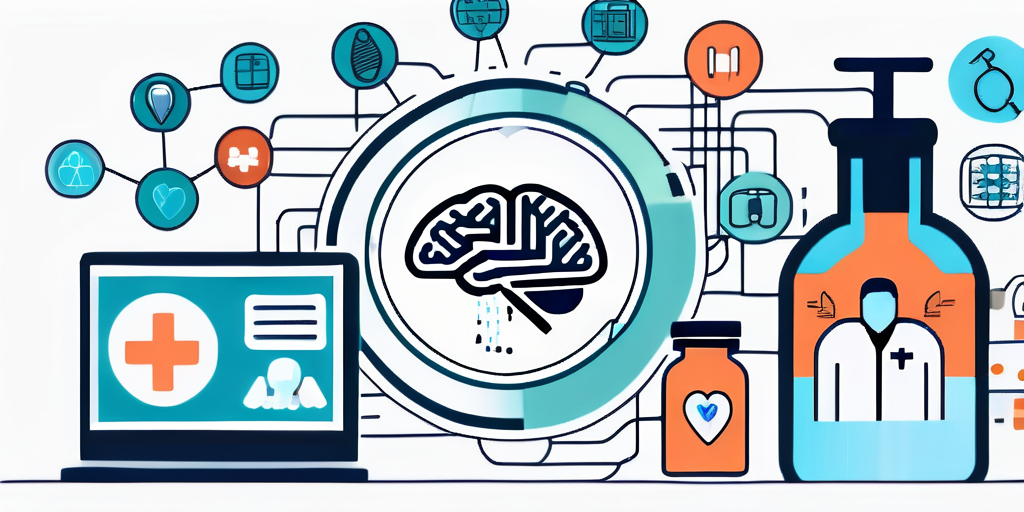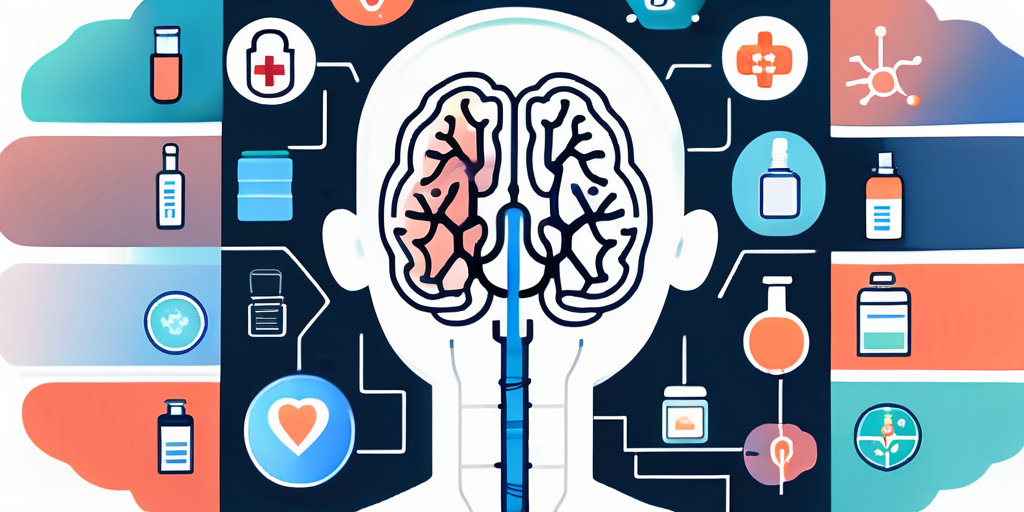In recent years, the use of Artificial Intelligence (AI) has become increasingly prevalent in various industries, and healthcare is no exception. AI is revolutionizing the way healthcare professionals set objectives and master schedules, enabling them to provide better care and improve patient outcomes.
Understanding the Role of AI in Healthcare
The rise of AI in modern healthcare has been instrumental in enhancing the delivery of medical services. AI technologies, such as machine learning algorithms, have enabled healthcare providers to analyze vast amounts of data and make predictions that can inform decision-making processes. This has allowed medical professionals to gain valuable insights and provide personalized treatment plans.
Furthermore, the integration of AI in healthcare has paved the way for innovative solutions in diagnostics and treatment. For instance, AI-powered imaging technologies can assist in the early detection of diseases such as cancer by analysing medical images with a high level of accuracy. This early detection can significantly improve patient outcomes and survival rates.
The Rise of AI in Modern Healthcare
AI has gained significant traction in healthcare due to its ability to handle complex tasks efficiently. According to a recent report by Accenture, the global AI market in healthcare is projected to reach $6.6 billion by 2021, growing at a CAGR of 40% from 2016 to 2021. This demonstrates the increasing adoption and investment in AI technologies within the healthcare sector.
Moreover, AI is revolutionising medical research and drug development processes. By analysing vast datasets and identifying potential drug candidates, AI algorithms can accelerate the discovery of new treatments for various diseases. This not only expedites the research process but also holds the promise of addressing unmet medical needs more effectively.
Key Functions of AI in Healthcare Management
AI plays a crucial role in healthcare management, particularly in setting objectives and managing schedules. It enables healthcare providers to improve operational efficiency, reduce costs, and streamline processes. Additionally, AI supports clinical decision-making by analyzing patient health records, identifying patterns, and suggesting treatment options.
Furthermore, AI can enhance patient engagement and satisfaction by providing personalised recommendations and remote monitoring services. Through AI-powered chatbots and virtual assistants, patients can access healthcare information, schedule appointments, and receive support round the clock, improving overall patient experience and outcomes.
Setting Healthcare Objectives with AI
Setting objectives is an essential aspect of healthcare management, as it helps healthcare organizations align their activities with their overall mission and vision. AI-driven objective setting provides healthcare professionals with valuable insights to develop effective strategies and improve patient outcomes.
When it comes to setting healthcare objectives, the integration of artificial intelligence (AI) has revolutionised the way decisions are made within the industry. By harnessing the power of AI, healthcare professionals can delve deeper into data analysis and predictive modelling to enhance the quality of care provided to patients.
The Process of Setting AI-driven Healthcare Objectives
AI automates the process of setting healthcare objectives by analyzing historical data, patient demographics, and clinical outcomes. Through advanced algorithms, AI identifies patterns and trends, facilitating predictive modeling. This enables healthcare professionals to determine the most effective interventions for specific patient populations, reducing trial and error in treatment plans.
Moreover, the use of AI in setting healthcare objectives allows for a more personalised approach to patient care. By considering individual patient data and tailoring interventions accordingly, healthcare providers can significantly improve treatment outcomes and patient satisfaction.
Benefits of AI in Healthcare Objective Setting
The utilization of AI in healthcare objective setting offers numerous benefits. Firstly, it enables healthcare providers to identify interventions that have the highest likelihood of success, reducing the risk of adverse outcomes. Secondly, it optimizes resource allocation by identifying areas with the greatest potential for improvement. Ultimately, AI empowers healthcare organizations to optimize their operations and enhance patient care.
Furthermore, the implementation of AI in healthcare objective setting fosters a culture of continuous improvement within healthcare organisations. By constantly analysing data and refining strategies based on AI insights, healthcare professionals can adapt to changing patient needs and industry trends effectively.
Mastering Schedules with AI in Healthcare
Efficient scheduling is vital in healthcare, ensuring that resources are utilized optimally and that patients receive timely and appropriate care. AI has proven to be a powerful tool in mastering schedules, improving efficiency, and enhancing the overall patient experience.
In addition to optimizing schedules, AI in healthcare also plays a crucial role in predictive analytics. By analysing historical data and trends, AI algorithms can forecast patient demand, enabling healthcare providers to proactively adjust their schedules and allocate resources accordingly. This proactive approach helps in preventing bottlenecks, reducing overcrowding, and ultimately enhancing the quality of care provided to patients.
How AI Optimizes Healthcare Scheduling
AI algorithms can analyze various factors, such as patient demand, clinician availability, and resource allocation, to create optimal schedules. By taking into account multiple variables simultaneously, AI can optimize workflow, reduce waiting times, and minimize scheduling conflicts. This facilitates the delivery of timely and efficient healthcare services.
Moreover, AI-powered scheduling systems can also incorporate patient preferences and priorities into the scheduling process. By considering factors like patient preferences for specific clinicians or appointment times, AI can tailor schedules to meet individual needs, improving patient satisfaction and engagement with their healthcare providers.
The Impact of AI on Healthcare Staff Scheduling
AI can also revolutionize staff scheduling in healthcare facilities. By considering factors such as clinician skills, preferences, and workload, AI algorithms can create balanced schedules that optimize staff resources. This ensures that the right clinicians are in the right place at the right time, improving the quality of patient care and staff satisfaction.
Furthermore, AI can facilitate seamless communication and collaboration among healthcare teams by providing real-time updates and notifications regarding schedule changes, patient status, and task assignments. This enhanced communication leads to improved coordination among staff members, ultimately benefiting both patients and healthcare providers.
Overcoming Challenges in Implementing AI in Healthcare
While the benefits of AI in healthcare are undeniable, the implementation of AI technologies does come with its challenges. Healthcare organizations must address these challenges to fully leverage the potential of AI in setting objectives and mastering schedules.
Implementing AI in healthcare not only revolutionises patient care but also transforms operational efficiency within healthcare organisations. The integration of AI technologies can streamline administrative tasks, enhance diagnostic accuracy, and improve treatment outcomes. However, this transformation is not without its hurdles.
Addressing Common Obstacles in AI Adoption
One common obstacle in AI adoption is the resistance to change. Healthcare professionals may be wary of relying on AI due to concerns about job security or a lack of understanding of AI’s capabilities. To overcome this, organizations must provide comprehensive training and education on AI and its potential benefits. Additionally, healthcare professionals must be involved in the decision-making process and kept informed throughout the implementation journey.
Another significant challenge in implementing AI in healthcare is ensuring data privacy and security. With the vast amount of sensitive patient information involved, maintaining confidentiality and compliance with data protection regulations is paramount. Robust cybersecurity measures, such as encryption protocols and access controls, must be implemented to safeguard patient data from potential breaches or misuse.
Strategies for Successful AI Implementation in Healthcare
Successful AI implementation in healthcare requires careful planning and strategy. It is essential to have a clear vision and roadmap, outlining the objectives and expected outcomes of AI integration. Collaboration with AI experts, data scientists, and clinicians is crucial to ensure that AI algorithms are tailored to the unique needs of the healthcare organization. Regular evaluation and feedback loops also enable continuous improvement and refinement of AI systems.
Furthermore, building a culture of trust and transparency around AI technologies is vital for successful implementation. Healthcare professionals need to understand how AI complements their expertise rather than replacing it. Open communication channels and opportunities for feedback can help foster acceptance and collaboration between human healthcare providers and AI systems, ultimately leading to improved patient care and outcomes.
The Future of AI in Healthcare Scheduling and Objective Setting
As technology continues to advance, the future of AI in healthcare looks promising. Predicted advancements in AI for healthcare are expected to further enhance objective setting and scheduling processes, ultimately improving patient care.
In addition to the anticipated developments in AI for healthcare, it is important to consider the ethical implications of integrating artificial intelligence into medical practices. Ensuring patient data privacy and maintaining transparency in how AI algorithms make decisions are crucial factors that healthcare providers need to address. By upholding ethical standards and regularly reviewing AI systems, healthcare organisations can build trust with patients and uphold the integrity of medical practice.
Predicted Advancements in AI for Healthcare
Experts predict the integration of AI technologies with Electronic Health Records (EHRs) to create a seamless and efficient healthcare system. By leveraging AI, healthcare professionals can gain comprehensive insights from patient data, allowing for more accurate diagnoses and personalized treatment plans. Furthermore, AI-powered virtual assistants and chatbots are expected to enhance patient engagement, providing 24/7 support and guidance.
Moreover, the potential applications of AI in healthcare extend beyond clinical settings. AI can also revolutionise administrative tasks such as appointment scheduling and resource allocation. By automating these processes, healthcare facilities can streamline operations, reduce wait times, and improve overall efficiency, ultimately leading to better patient outcomes.
Preparing for the Future of AI in Healthcare Management
As healthcare organizations prepare for the future of AI, it is crucial to stay up-to-date with the latest developments and advancements in AI technology. Collaboration with AI experts, data scientists, and digital marketing agencies focused on healthcare marketing can provide valuable guidance and support in navigating the evolving landscape of AI in healthcare management. By embracing AI and continuously adapting to advancements, healthcare organizations can optimize patient care and drive positive outcomes.
Furthermore, investing in staff training and development to enhance AI literacy among healthcare professionals is essential for successful integration of AI technologies. By empowering staff with the knowledge and skills to effectively utilise AI tools, healthcare organisations can maximise the benefits of artificial intelligence in improving patient care and operational efficiency.
As we navigate the transformative landscape of AI in healthcare, the opportunity to elevate your clinic’s operational efficiency and patient care is at your fingertips. Angelo Rosati and the team at Clinic Marketing AI bring a wealth of experience, blending healthcare, marketing, and artificial intelligence to partner with you in achieving excellence. Don’t just keep pace with the future; define it. Book a Call with Us today, and together, we’ll set the course for your clinic’s success in the era of AI-driven healthcare.



